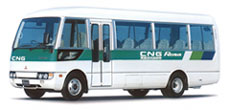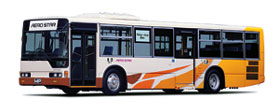Tokyo, March 26, 2003—Mitsubishi Fuso Truck & Bus Corporation announces
that cumulative production of Mitsubishi Fuso low-emission buses that meet specific
local government1 requirements for LEV certification have topped 400 vehicles.
Mitsubishi Fuso has, for several years now, led the industry in the development
and production of “eco-friendly” and “barrier-free” buses
for the Japanese market.
Mitsubishi Fuso first introduced a LEV-7 certified low-emission version of the
Aerostar large city bus in 2000. Since then, the company has put on the Japanese
market several bus models that comply with the various low-emission certification
systems in force in Japan today: LEV-7, the Tokyo Metropolitan Government (TMG)
Ordinance and LEV-6. Sales of Fuso LEV-certified buses started at 23 units in
2000, increasing to 25 units in 2001 and to 353 units in 2002, bringing the cumulative
total over the 400 unit mark. In a break-down of total Fuso bus sales, Fuso LEV-certified
buses accounted for 8% of total Fuso bus sales volume in FY2002, are expected
to account for 15% in FY2003, and for nearly all sales by FY2005.
In its role as a leading truck and bus manufacturer, Mitsubishi Fuso ranks the
development of envi-ronmentally-friendly vehicles as one of its principal corporate
goals. The company is committing significant managerial, R&D and engineering
resources to the development of low-emission diesel engines and of hybrid electric
propulsion systems in order to increase the proportion of low-emission commercial
vehicles on Japans roads as soon as possible. |
| |
Principal features of Fuso LEV-certified
buses
- Aerostar CNG2 Non-step: The only
large bus in Japan to achieve LEV-7 and TMG Ordinance U-LEV3 certification.
- Rosa CNG: The only CNG-fuelled
small bus in Japan to achieve LEV-7 and TMG Ordinance U-LEV certification.
- Aerostar HEV4 Non-step: Undergoing
a proving program started in June 2002 with a view to market launch in late 2003.
The Fuso lineup of diesel-powered buses also includes a wide range of LEV-certified
models available at attractive prices. |
| |
 |
 |
Mitsubishi Fuso CNG
Rosa
LEV-7 & TMG Ordinance
U-LEV certifi-cation |
Mitsubishi Fuso Aerostar
Low-emission Diesel
LEV-7, TMG Ordinance & LEV- 6 certifi-cation |
|
| |
1. Fuso LEV buses
Mitsubishi Fuso’s history of low-emission vehicle development started in
1971 with an electrically-powered bus that used lead-accumulator batteries. This
was followed by the development and production of an Aerostar city bus using the
MBECS5 diesel-hydraulic accumulator hybrid propulsion system in 1994. The company
placed an Aerostar model fitted with the improved MBECS-III system on the market
in 1996.
Mitsubishi Fuso has also raised the bar in diesel engine emissions technology,
introducing such advanced features as 4-valve cylinders, high-pressure fuel injection
and fuel injection optimization. To promote the more widespread use of low-emission
commercial vehicles, Mitsubishi Fuso currently offers at attractive prices a wide
range of models that have earned LEV-certification thanks to these clean engines.
The company is also actively developing and currently markets models powered by
CNG-fuelled engines that deliver even cleaner environmental performance.
Mitsubishi Fuso is focused on promoting more widespread use of low-emission trucks
and buses on Japans roads. To that end, it has placed on the market several HEV
models and other models using new propulsion systems. The company is also working
to improve the environmental performance of its diesel engines by phasing in oxidizing
catalytic converter mufflers and other engine-out exhaust gas technology that
cleanses and reduces tailpipe emissions. |
| |
(1) Mitsubishi Fuso large city buses
- The Aerostar Non-step CNG LEV city
bus offers an ideal marriage between barrier-free and eco-friendly qualities.
The Mitsubishi Fuso large bus lineup includes LEV-certified versions of non-step,
one-step and two-step models powered by low-emission diesel engines.
- In collaboration with the Ensyu
Railway Co.,LTD. in Shizuoka Prefecture, in June 2002 Mitsubishi Fuso started
proving trials of a Aerostar Non-step HEV large bus powered by a series-configuration
hybrid propulsion system. The company plans to launch this bus at the end of the
year.
|
| |
(2) Mitsubishi Fuso small buses
- Mitsubishi Fuso launched a LEV-certified
Rosa small bus powered by a low-emission diesel engine in March 2000, and the
U-LEV Rosa CNG model in June 2002.
- Actively responding to strong appeals
from its customers, Mitsubishi Fuso will be launching the Rosa CNG Kindergarten
bus in the very near future.
|
| |
| |
| Model |
Specifications |
Certification |
Produc-tion vol-ume |
| LEV-7 |
TMG Ordi-nance |
LEV-6 |
| Aero-star |
One-step city bus
184kW (250PS) |
LEV |
LEV |
Compliant |
143 |
Non-step city bus
184kW (250PS) |
LEV |
LEV |
Compliant |
74 |
One-step city bus
235kW (320PS) |
LEV |
LEV |
Compliant |
8 |
Two-step bus
235kW (320PS) |
LEV |
LEV |
Compliant |
1 |
| CNG non-step city bus
|
U-LEV |
U-LEV |
(No applicable classification) |
28 |
HEV non-step city bus
(market launch end of 2003) |
(Certification application to be
submitted) |
(Certification application to be
submitted) |
(Certification application to be
submitted) |
- |
| Rosa |
LEV version |
LEV |
LEV |
Compliant |
141 |
| CNG version |
U-LEV |
U-LEV |
(No applicable classification) |
6 |
| |
Cumulative
production of Mitsubishi Fuso LEV buses (as at 18 March 2003) |
401 |
|
| |
- The three major LEV-certification
schemes applicable in Japan today are: (1) LEV-7 or The Seven Metropolitan Prefectural
/ Municipal Authorities Low-Emission Vehicle Certification System (covering the
prefectures of Saitama, Chiba and Kanagawa and the cities of Tokyo, Yokohama,
Kawasaki and Chiba); (2) The Environment Insurance Ordinance enacted by the Tokyo
Metropolitan Government (TMG) in December 2000, and; (3) LEV-6 or The Six Prefectural
/ Municipal Authorities Low-Emission Vehicle Certification System (covering the
prefectures of Kyoto, Osaka, Hyogo and the cities of Kyoto, Osaka and Kobe).
- Compressed Natural Gas
- U-LEV is a category of reduced
exhaust emissions. To qualify for U-LEV certification, emissions must be at least
75% lower than the levels required under Japan's 2000 exhaust emission regulations.
U-LEV is the most stringent level specified under the low-emission vehicle certification
system inaugurated in April 2000 by the former Ministry of Transport (currently
Ministry of Land, Transport and Infrastructure.)
- Hybrid Electric Vehicle
- MBECS III (Motor vehicle Brake Energy
Conservation System) is a hybrid system which reduces pollution while improving
fuel consumption. Based around a regenerative braking system in which kinetic
energy stored during braking and deceleration is reused when the vehicle moves
off or accelerates, MBECS III comprises an Engine Idling Stop & Start System
which automatically cuts off the engine down when the vehicle is stationary and
starts it up again when it moves off, and an Oxidizing Catalytic Converter which
significantly reduces particulate emission. A bus fitted with the system became
the first diesel-powered vehicle to meet all requirements of the Japanese Long-term
Exhaust Emissions Regulations. Further improvements made in December 1996 help
the system realize a 23 percent improvement in urban fuel consumption and a reduction
of between 50 and 70 percent in black smoke when moving off and accelerating compared
with a conventional
|
![]()
![]()